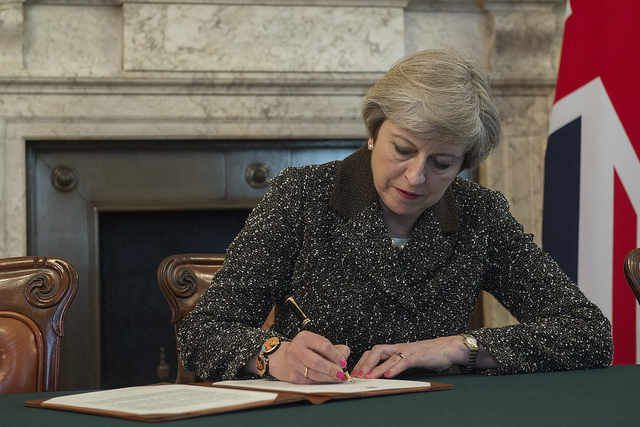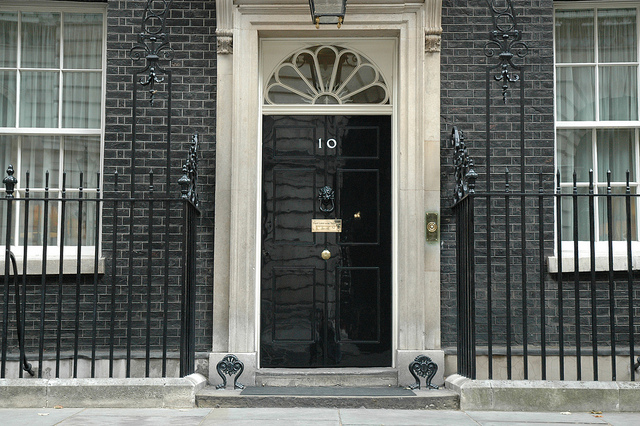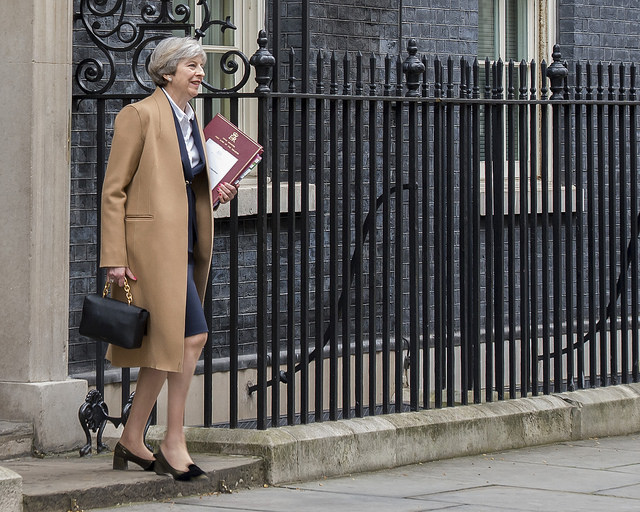Gebroken - Theresa May’s gok met vroege verkiezingen is mislukt

Theresa May’s gok liep slecht af. Nu ligt alles open – ook de Brexit. (Engelstalige blog)
This morning, Prime Minister Theresa May (Conservative Party) must have been painfully reminded of something Beatles singer John Lennon once said: “Life is what happens to you while you’re making other plans” – or if you’re so inclined, and as famously proclaimed by the Rolling Stones: “You can’t always get what you want”. When the Conservative leader strode out to the waiting cameras assembled at 10, Downing Street in mid-April, she called the election in order to gain a stronger hand in the upcoming Brexit negotiations with the European Union. She said: "I have only recently and reluctantly come to this conclusion. Since I became prime minister I have said that there should be no election until 2020, but now I have concluded that the only way to guarantee certainty and stability for the years ahead is to hold this election and seek your support for the decisions I must take”. Opinion polls gave her a lead of up to 21 per cent at one point – pointing towards a possible landslide.
At the time of this post being written, the Conservative Party has won 314 seats, Labour 261 seats, the Scottish National Party 35 seats, the Liberal Democrats 12 seats and the Democratic Unionist Party 10 seats, with other parties achieving 13 seats. Thus, the Conservative Party has lost its majority in the House of Commons. The combination most likely to command a working majority will be the Conservative Party receiving the support of the Democratic Unionist Party (DUP) from Northern Ireland – quite possibly via a confidence-and-supply arrangement.
Prime Minister Hammond? Theresa May could very well be forced to resign by her own party. She called the election in the expectation that the Conservative Party would be returned to an enhanced majority. She risked an existent majority of 330/650 seats – and lost that majority in the process. Her political instincts appear out of step, as evidenced by the controversy around social care, her refusal to debate her opponent, Labour Party leader Jeremy Corbyn and her inability to run an inspired campaign. Look towards Chancellor of the Exchequer Philip Hammond or Defence Secretary Michael Fallon to succeed May, should her resignation come to pass.
Brexit no longer necessarily means (hard) Brexit: Theresa May’s concept of Brexit remained unclear throughout the campaign. She was unwilling to provide any guarantees to EU citizens, ratcheted up the pressure on the “divorce bill” to be paid to the European Union and even went so far as to accuse unnamed “Brussels bureaucrats” of interference in the election campaign. No doubt, there will be some smiles around the corridors of the Berlaymont Building in Brussels (the seat of the European Commission), the Elysée Palace in Paris and the Federal Chancellery in Berlin. Given the narrow majority, the fact that the likely ally is the DUP (which favours a soft Brexit, allowing the UK to remain within the European Economic Area) and given the factionalism within the Conservative Party, the Prime Minister (whether May or someone else) will need to adjust its negotiation position. How she will reconcile the positions of hardcore Leave supporters and equally adamant Remain advocates is anyone’s guess.
Instability at the wrong time: The result heralds more instability at just the wrong time. Negotiations with the European Union are scheduled to begin within the fortnight, and complex issues like the status of EU citizens, immigration, financial debts, future jurisdiction of the European Court of Justice have not gone away. The authority of the current Conservative Party government has been diminished – with the European Union possibly less inclined to make any meaningful compromises during the withdrawal talks. In fact, at this time, there is talk of the European Union delaying the negotiations for the foreseeable future.
Meanwhile, the countdown towards Brexit is ticking. On 30 March 2019, at midnight, the UK will leave the European Union. After tonight, the contours of the new direction in Britain’s history appear much less clear than before.
Published on Law Blogs Maastricht and on LEGALLY OPINIONATED image Flickr by Number 10
Andere blogs:
Lees ook
-
Een jaar na het succesvolle Brexit referendum, liggen de kaarten allemaal aan de kant van de Europese Unie. Wat Brexit betekent in zo'n klimaat laat zich raden, zelfs na twaalf maanden. (Engelstalige blog)
-
Zij beslist: Arleen Foster, MLA, de leider van de ''Democratic Unionist Party'' heeft de touwtjes goed in handen in de conservatieve minderheidsregering. (Engelstalige blog)
-
Een jaar na het succesvolle Brexit referendum, liggen de kaarten allemaal aan de kant van de Europese Unie. Wat Brexit betekent in zo'n klimaat laat zich raden, zelfs na twaalf maanden. (Engelstalige blog)


